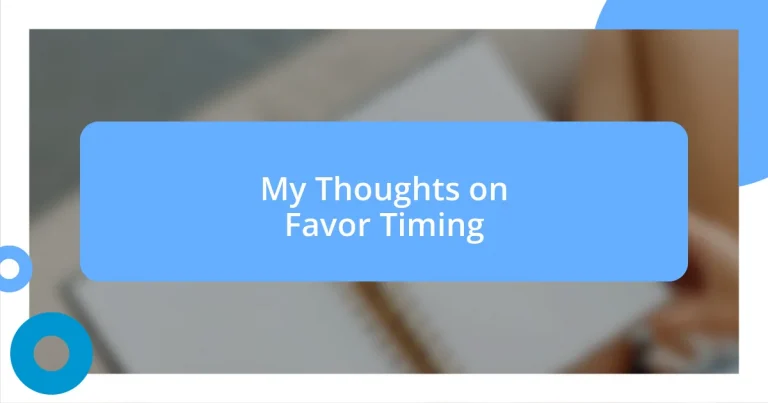Key takeaways:
- Timing is crucial when asking for favors; choosing the right moment can enhance receptiveness and strengthen relationships.
- Being considerate of others’ personal circumstances and mood can significantly impact the outcome of requests.
- Clarity, gratitude, and the method of communication are essential factors that influence how favors are perceived and received.
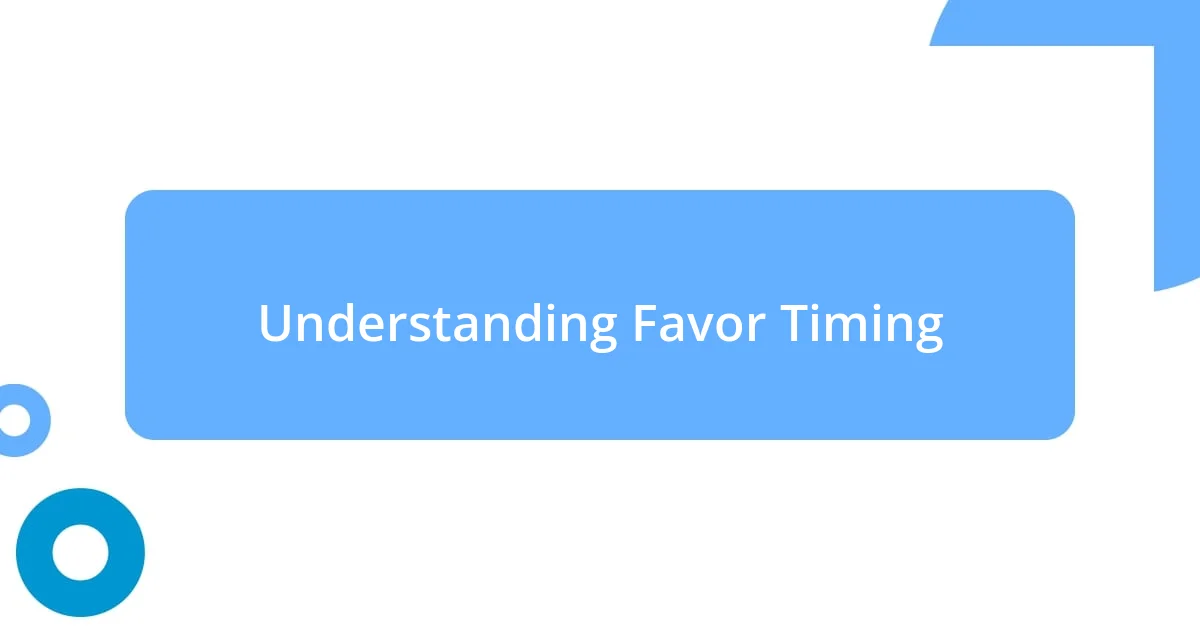
Understanding Favor Timing
Understanding favor timing is all about recognizing the right moments to ask for help or support from others. I recall a time when I hesitated to seek a favor because I felt it was an imposition. Looking back, I realize I missed an opportunity simply because I didn’t act when the moment felt right. Have you ever wondered if your timing was off when you asked for something?
It’s interesting how timing can transform a simple request into something impactful. For example, during a hectic period at work, I approached a colleague for assistance—but I chose a moment when they seemed relaxed, and it made all the difference. They felt appreciated instead of burdened, illustrating how being mindful of someone else’s schedule can lead to more favorable outcomes.
The emotional weight behind our requests is often linked to timing. I’ve learned that a well-timed favor can create a bond, while a poorly timed one might strain relationships. Have you felt that connection when you chose your moment wisely? I’ve experienced those moments, and they’ve taught me the importance of understanding not just what you ask for, but when you ask for it as well.
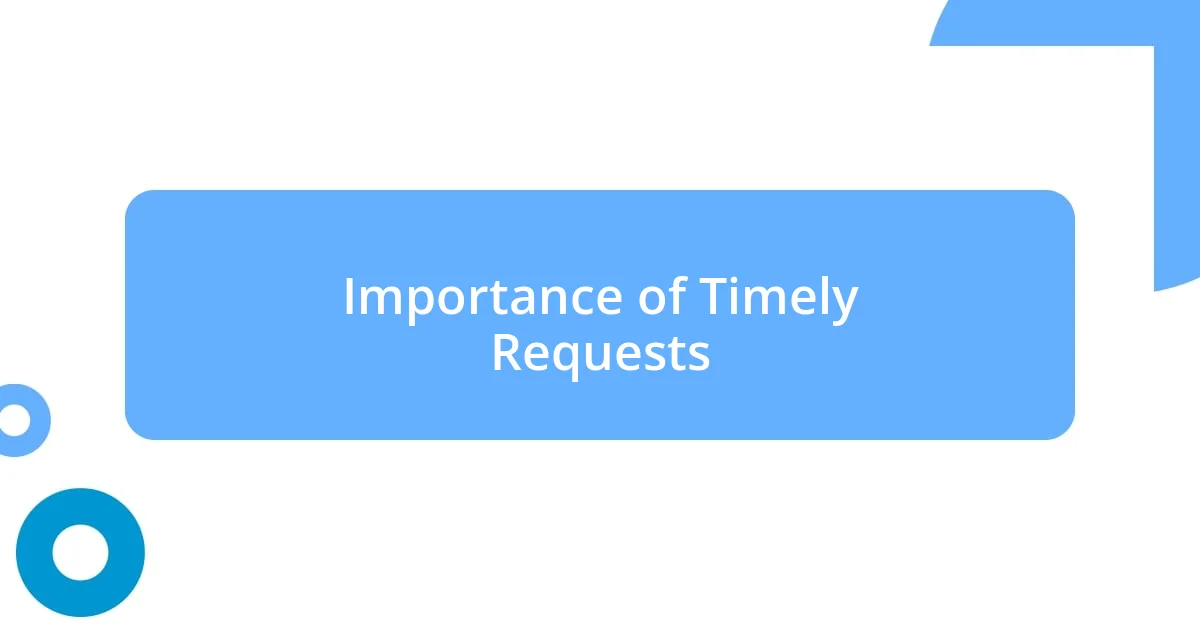
Importance of Timely Requests
Timely requests can make all the difference in whether they are honored or brushed aside. I once asked a favor from a friend while they were preparing for an important presentation. My timing was off, and I could see their frustration. On the other hand, when I later approached the same friend after their big day, they were more than willing to help. This taught me the value of being considerate about the other person’s circumstances when making requests.
When requests are made at the right moment, they can pave the way for deeper connections. I remember reaching out to a colleague during a casual lunch break instead of a stressful deadline rush. The casual nature of that moment led to an open discussion, and they offered insights that tremendously helped my project. That experience highlighted how friendly environments can nurture collaborative support, reinforcing my belief that timing is crucial in fostering goodwill.
In professional settings, the impact of timely requests can’t be overstated. I often reflect on instances where I felt like a burden when asking for help during busy times. Conversely, I’ve found that a quick check-in before asking can turn a simple request into a shared experience, leading to a more willing response. Choosing the right moment isn’t just about convenience; it’s about creating a sense of respect and understanding in our interactions.
| Aspect | Impression of Timely Requests |
|---|---|
| Example Scenario | Outcome |
| Asking during a busy time | Increased likelihood of frustration |
| Asking after a significant achievement | Higher willingness to assist |
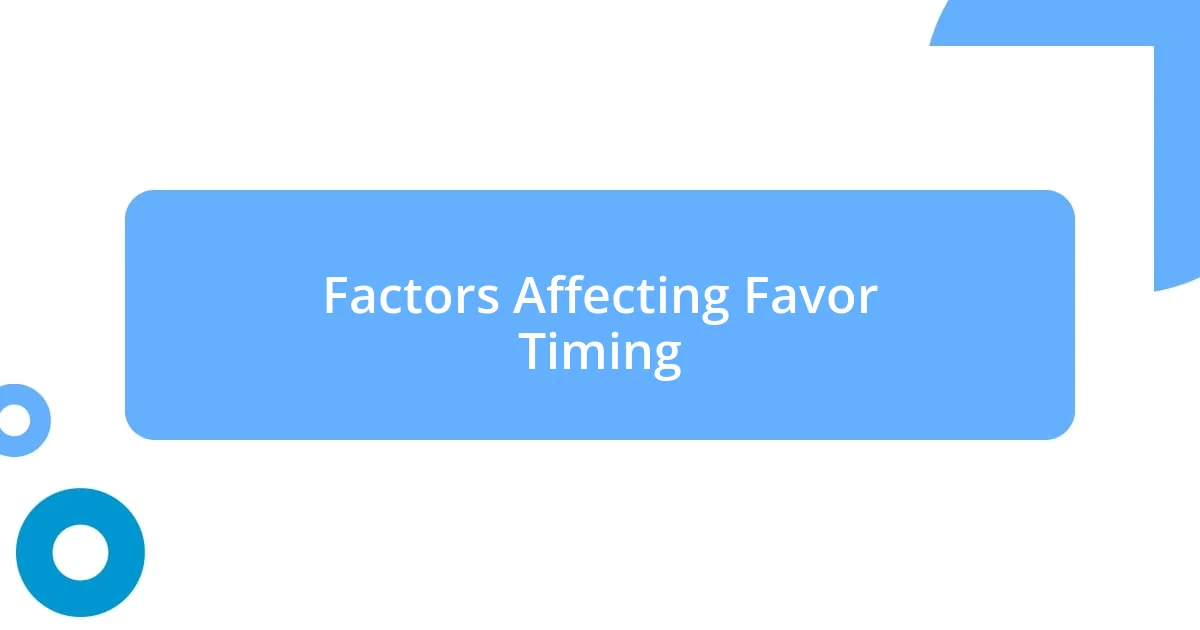
Factors Affecting Favor Timing
When it comes to favor timing, it’s fascinating to see how personal circumstances significantly influence outcomes. For instance, I remember a time I was feeling overwhelmed with my own tasks while volunteering for a community project. I hesitated to ask for support, fearing it would add to my friends’ stress. Eventually, I learned that if you gauge the emotional and situational context—like understanding someone’s workload or mood—it can lead to a more productive exchange.
Here are some factors that can affect favor timing:
- Personal Stress Levels: If the person is under pressure, they may not be receptive to requests.
- Context of the Relationship: A solid prior connection might make favors more acceptable.
- Current Events: Life events, like celebrations or crises, can shift priorities and openness.
- Timing of the Day: Early mornings may foster different energy compared to late afternoons—if I can, I try to avoid asking for favors at times when people are likely to be fatigued.
I recognize that timing isn’t strictly about the clock—it’s about reading emotional cues as well. During another community event, I chose to engage a friend who had just finished a presentation and looked relieved. They were immediately more open and willing to help with another project I had in mind. This taught me that being aware of how others feel can lead to better outcomes, allowing us to build a stronger sense of camaraderie.
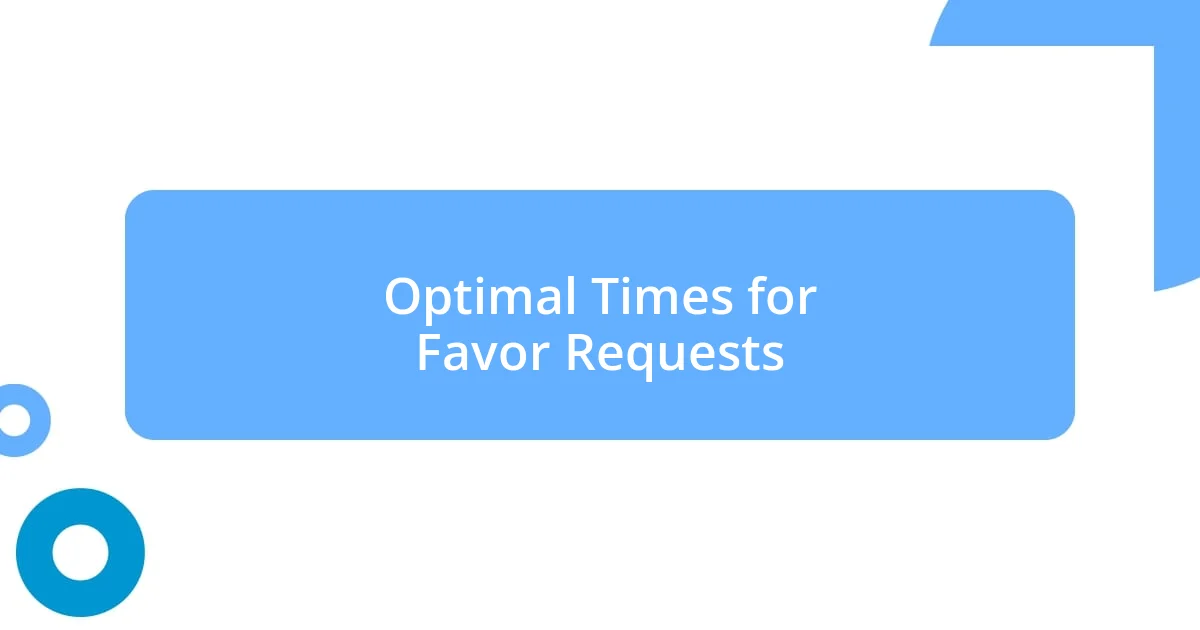
Optimal Times for Favor Requests
When I think about optimal times for favor requests, I often recall a specific afternoon when I approached a friend just as they were unwinding after a long day. The look of relief on their face said it all—my request, which could have been met with resistance, flowed easily because I picked a moment when they were relaxed and receptive. Isn’t it fascinating how a simple shift in timing can completely change the dynamics of a conversation?
Additionally, I’ve learned that Fridays often create an upbeat atmosphere where people are more inclined to say yes. For instance, I remember asking a colleague for assistance with a project just as we were wrapping up for the week. The festive energy in the office made them more enthusiastic about helping out. It’s like tapping into a collective vibe; does the timing of your request align with when others feel good about contributing?
Furthermore, I’ve found that before major holidays can be an ideal time to ask for favors. A few years ago, I sought help from a neighbor to borrow a tool right before Labor Day weekend. Instead of the usual rush, we exchanged stories about our plans, which built a positive rapport. The spirit of community during these times can reveal a willingness to lend a hand. Isn’t it interesting to think about how these moments can cultivate camaraderie and generosity?
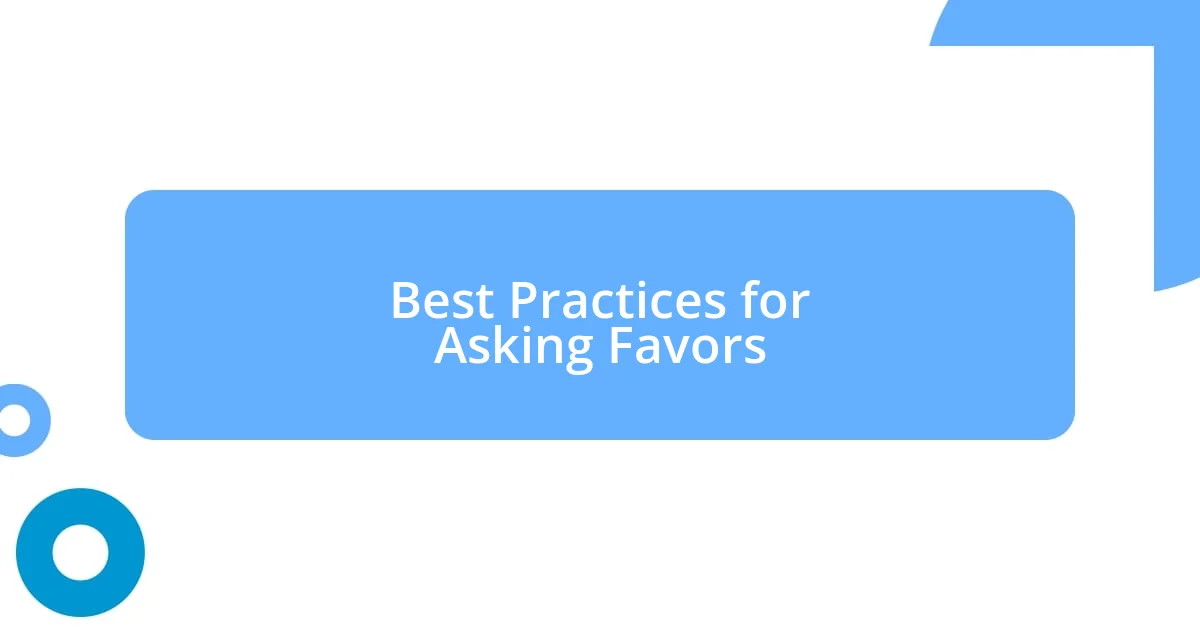
Best Practices for Asking Favors
When asking for a favor, clarity is key. I remember a time when I approached a friend about borrowing their camera. Instead of just saying, “Can I borrow it?” I included specifics about how long I needed it and why it mattered to me. This transparent communication not only made my request feel legitimate but also helped my friend feel more invested in my project. Have you ever noticed how providing context can transform a simple favor request into a meaningful dialogue?
Another practice I’ve found invaluable is expressing appreciation upfront. Recently, I reached out to a colleague for help on an important presentation. I led with a heartfelt thank you for all their past support before even making my request. Their response was immediate enthusiasm instead of hesitation. Isn’t it interesting how acknowledging someone’s value can make them more inclined to help?
Ultimately, choosing the right medium for your request can drastically influence outcomes. I once sent a text asking for a favor during a hectic workday, only to realize later that a face-to-face conversation would have created a stronger connection. Reflecting on that experience, I learned that how we communicate matters just as much as what we say. Have you found that certain methods of communication create more willingness in others?
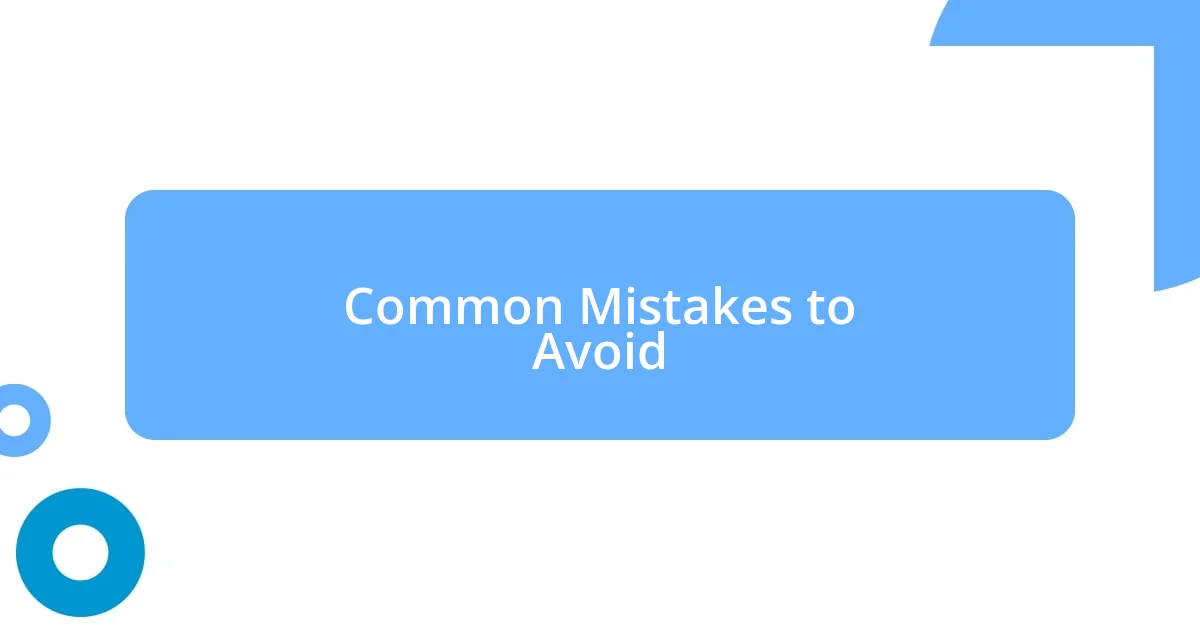
Common Mistakes to Avoid
One common mistake I see when asking for favors is the lack of consideration for the other person’s state of mind. I remember a time when I asked a family member for help with moving right after a long day at their job. Their exhausted expression told me everything—I should have waited for a moment when they felt more energetic. Have you ever noticed how the mood of the person you’re asking can dictate the outcome of your request?
Another pitfall is being overly vague about what you’re asking for. I once reached out to a teammate for assistance but simply said, “Can you help me?” without specifying what I needed. The result was confusion and hesitation, making both of us feel frustrated. It really struck me how important it is to articulate exactly what you’re seeking. Do you think a little detail could make a huge difference in how others perceive your request?
Lastly, I’ve learned that timing isn’t just about the right moment; it’s also about the right relationship dynamic. There was an occasion when I tried to ask a colleague for a favor during a busy meeting. I realized afterward that this wasn’t the best time, as they were stressed and overwhelmed. It made me reflect on how crucial it is to gauge both timing and the context of your relationships before making a request. Isn’t it interesting how these seemingly small factors can lead to vastly different outcomes?
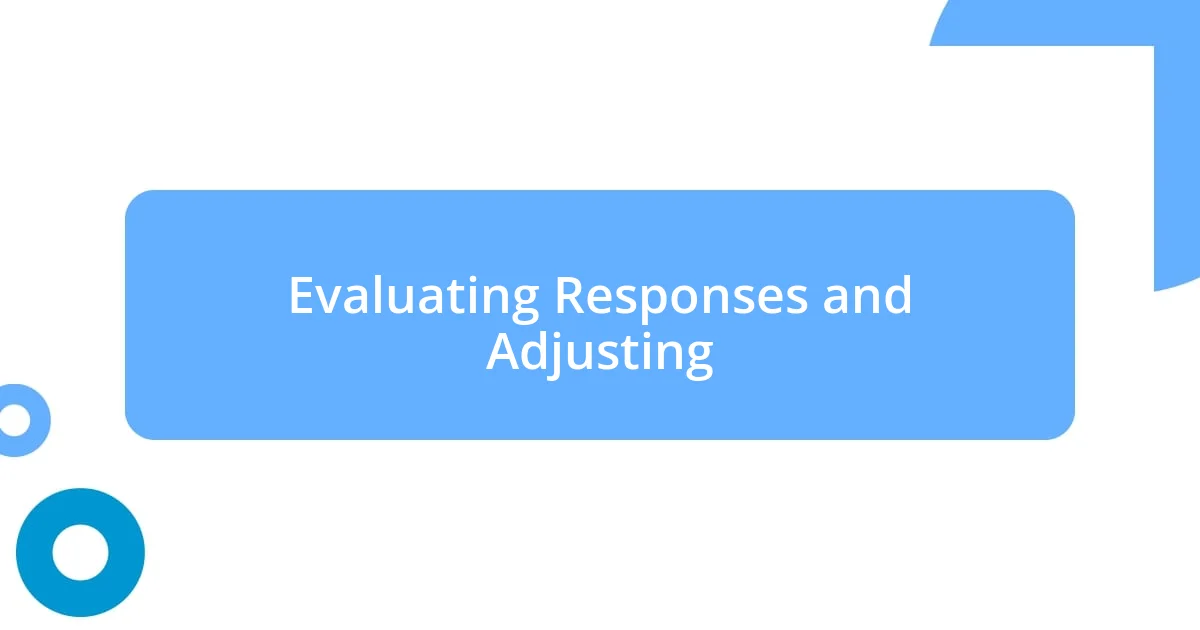
Evaluating Responses and Adjusting
When evaluating responses to my favor requests, I’ve found that paying attention to non-verbal cues is essential. I recall a time when I asked a friend for a favor, and while they verbally agreed, their body language suggested otherwise. Their hesitation made me rethink my approach. Have you ever felt that someone was saying yes but meant it differently? Adjusting my request based on those subtle signals not only improved our communication but also deepened our relationship.
I’ve also learned the importance of being flexible. Last year, I reached out to a neighbor for help with my garden, but their schedule was packed. Instead of pushing them, I asked if there was a better time or another way they could assist. Their willingness to suggest an alternative made the interaction more productive and opened up avenues for future favors. Isn’t it fascinating how a little adaptability can change the entire conversation?
Finally, I always take a moment to reflect on the feedback I receive, whether positive or negative. Just recently, after asking a coworker for their insights on a project, I noted their feedback was a bit hesitant. Rather than dismissing it, I followed up to understand their concerns better. This not only addressed my request but also helped me improve my approach in the future. Have you found that revisiting a conversation can reveal deeper layers of understanding?












